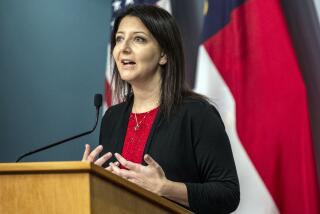Latina Reported in Line to Succeed Koop
WASHINGTON â President Bush has decided to nominate Antonia Novello, a public health service officer, to replace C. Everett Koop as U.S. surgeon general, Administration and congressional sources said today. If confirmed by the Senate, she would become the first woman to serve in the post.
âFBI background checks on her are under way,â one White House source said. âThatâs the only thing that would derail it, and we donât expect that to happen.â
Novello, 44, is deputy director of the National Institute of Child Health and Human Development, a component of the National Institutes of Health.
A Novello aide said she would have no comment about her possible appointment to the post.
A native of Puerto Rico, Novello began her career at NIH in 1978. She earned a doctorate from the School of Public Health at Johns Hopkins University in Baltimore.
White House officials have been eager to name Latinos to highly visible Administration posts in order to fulfill a pledge Bush made during last yearâs presidential campaign.
The Bush Administration has two Latinos in the Cabinet, Education Secretary Lauro F. Cavazos, who was initially appointed to the post by former President Ronald Reagan, and Interior Secretary Manuel Lujan Jr.
The selection of Novello was expected to be greeted warmly in Congress, where her appearances before congressional committees have won praise, staff members said.
âShe can handle herself well,â said one staff member of a congressional health committee. âSheâs a good choice.â
As an NIH congressional fellow, she served for two years as a physician adviser to Sen. Orrin G. Hatch (R-Utah), who was then chairman of the Senate Labor Committee with jurisdiction over national health policy.
Her appointment to the post of surgeon general was strongly backed by Hatch, currently the top Republican on the labor committee.
The post of surgeon general is largely symbolic, and has few official powers. Koop, however, took the job to the limits by using it as a pulpit to preach public health policy outside the formal policy-making loop.
He took a hard line, for example, against smoking despite extensive political pressure from the tobacco industry and generated an uproar by urging detailed discussion of sexual activity as part of an AIDS education program.
An anti-abortion activist before his appointment to the job, Koop initially was treated as a pariah by the public health community and by pro-choice forces.
His outspoken advocacy of common-sense health approaches and his political courage soon won him the admiration of the very groups who had strongly opposed his appointment.
More to Read
Sign up for Essential California
The most important California stories and recommendations in your inbox every morning.
You may occasionally receive promotional content from the Los Angeles Times.










